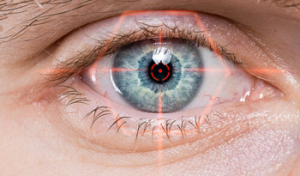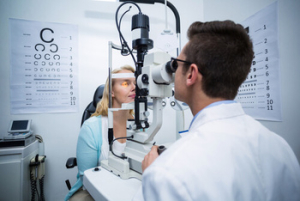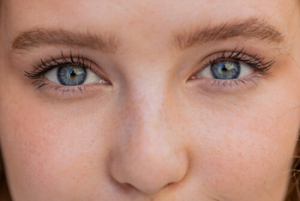Blurry Vision In One Eye: Causes, Diagnosis, & Solution
Blurry vision in one eye can catch you off guard. One moment, everything looks fine, then suddenly, your vision in one eye seems cloudy, hazy, or just not quite right. Whether it creeps in slowly or appears without warning, it’s natural to feel uneasy when your eyesight changes.
While some causes of blurred vision in one eye are minor and resolve independently, others may point to something that needs closer attention. The key is knowing what’s normal, what’s not, and when to act.
In this article, you’ll discover what can cause blurry vision in one eye, how to tell the difference between short-term changes and more serious conditions, and how these issues are managed by experienced eye care providers here in Australia.
If you’re feeling unsure or anxious, you’re not alone and in the right place to gain clarity, take control, and feel more confident about your next step.
What The Timing Of Blurry Vision In One Eye Might Mean
 The timing of your symptoms, whether they appeared suddenly or developed slowly over time, can offer valuable clues about what’s happening beneath the surface.
The timing of your symptoms, whether they appeared suddenly or developed slowly over time, can offer valuable clues about what’s happening beneath the surface.
Paying attention to how your blurry vision in one eye began is more than just a detail; it could be the difference between peace of mind and catching something early that needs attention.
A Sudden Change In One Eye
If your blurry vision in just one eye appeared out of nowhere, it’s important to take it seriously. Sudden vision disturbances in a single eye can sometimes be linked to eye-specific conditions that may need urgent care, such as acute angle-closure glaucoma, retinal detachment, or disruptions in blood flow affecting the optic nerve.
While not all sudden changes are emergencies, certain warning signs, like eye pain, a shadow in your field of view, or light sensitivity, should prompt you to seek professional guidance without delay. Early detection plays a critical role in having healthy vision.
Gradual Changes In One Eye
If your vision in one eye has been growing blurry over time, the cause might be more chronic. Conditions like age-related macular degeneration, diabetic eye disease, or refractive errors can cause a slow decline in visual clarity in just one eye.
These shifts may not seem urgent, but they can still affect your ability to see fine details or read comfortably. Fortunately, many of these conditions can be managed once identified. Booking an eye check-up is a proactive way to protect your long-term eye health and regain confidence in your vision.
Main Causes Of Blurry Vision In One Eye
Let’s take a closer look at several key causes behind vision problems in one eye.
Refractive Errors
Refractive errors like myopia, hyperopia, or astigmatism may affect one eye more than the other, especially if you depend on contact lenses or prescription glasses that don’t fully correct your individual needs.
These issues relate to the imperfect focusing power of your eye and may make your vision blurry at certain distances.
Treatment options such as corrective lenses or laser surgery can improve clarity and reduce dependence on glasses over time.
Cataracts
While cataracts usually affect both eyes, one eye can become clouded faster than the other. A cataract forms when the eye’s natural lens loses transparency, resulting in cloudy vision, reduced contrast sensitivity, and difficulty seeing fine details.
Fortunately, cataract surgery is one of the most effective ways to restore healthy vision in affected individuals.
Macular Degeneration
Macular degeneration is a cause of central vision difficulty among Australians over 50. It comes in two types: dry macular degeneration and wet macular degeneration. Both can cause distortion or vision loss in one eye, particularly in the centre of your field of view.
While dry macular degeneration tends to develop gradually, wet macular degeneration may cause sudden blurred vision and typically requires immediate attention to preserve vision.
Retinal Detachment
 This happens when the retina pulls away from its normal position at the back of the eye, disrupting your visual field. Symptoms may include floaters, flashing lights, or a dark curtain over part of your vision. A retinal detachment is an emergency that might cause permanent vision loss without timely treatment.
This happens when the retina pulls away from its normal position at the back of the eye, disrupting your visual field. Symptoms may include floaters, flashing lights, or a dark curtain over part of your vision. A retinal detachment is an emergency that might cause permanent vision loss without timely treatment.
Our retinal ophthalmologist offers prompt and effective management of retinal conditions to help safeguard your peripheral vision and central vision alike.
Diabetic Retinopathy
This condition may cause blurry vision, floaters, or even temporary blindness in one eye.
If you live with diabetes, routine eye exams are essential. Catching diabetic eye disease early is key to preventing further damage and preserving normal vision.
Glaucoma
Glaucoma is a group of conditions that increase pressure inside the eye, possibly damaging the optic nerve. It often develops without symptoms, but in some cases, particularly with acute angle-closure glaucoma, you may notice blurred vision, eye pain, headache, and nausea.
Because irreversible vision loss can occur, early detection and management through laser treatment, medication, or surgery are vital.
Corneal Conditions
The cornea, the clear outer layer of your eye, can be affected by infections, trauma, or diseases like keratoconus. These can distort the way light enters your eye, leading to hazy vision or distorted vision in one eye.
Your anterior eye doctor can recommend the most suitable treatment options, which may include customised lenses or corneal surgery.
Eye Infections
Some eye infections cause inflammation that leads to vision problems in one eye before spreading to both eyes. Infections may also cause light sensitivity, redness, discharge, or pain.
It’s important not to self-diagnose. Your eye doctor can assess the infection and determine whether eye drops, oral medication, or other care are needed.
Eye Strain
Spending long hours in front of screens without taking breaks may lead to eye strain, which can sometimes affect one eye more than the other. Symptoms include hazy vision, fatigue, and discomfort.
How Is Blurry Vision In One Eye Diagnosed?
When you’re experiencing blurry vision in one eye, it’s natural to wonder what’s happening and whether it’s serious. Getting answers starts with a clear, compassionate assessment from a qualified eye doctor who knows what to look for.
At your appointment, your ophthalmologist will take the time to understand your full picture, asking about your symptoms, medical history, and how your vision has changed over time.
 From there, a tailored eye exam can help uncover the underlying cause.
From there, a tailored eye exam can help uncover the underlying cause.
This may include:
- Checking how each eye processes detail and depth
- Looking closely at your retina, optic nerve, and blood vessels
- Assessing your visual field and central vision clarity
The goal isn’t just to spot what’s wrong; it’s to help you understand your eye health and what can be done to improve or protect it. No two people are the same, so your care will be adjusted to suit your unique situation.
Whether the issue is minor or requires closer attention, you’ll be guided step by step with clarity, not guesswork.
Managing Blurry Vision In One Eye
Blurry vision in one eye can feel like a sudden shift in how you experience the world. But the right approach, backed by professional insight, can help you see things clearly again.
Treatment depends on what’s causing the issue, but with early diagnosis, many options can help preserve or even improve your sight. These may include:
- Prescription glasses or contact lenses to fix refractive errors
- Laser eye surgery for eligible patients seeking long-term clarity
- Medicated eye drops or tablets to reduce pressure in glaucoma
- Retinal procedures or injections to address conditions like macular degeneration or retinal detachment
- Lifestyle coaching and support for managing diabetic eye changes
Your vision journey is as individual as you are. What matters most is taking that first step towards diagnosis and care because timely support can make all the difference.
You don’t need to navigate it alone. A personalised plan, developed in partnership with your eye doctor, can help you move forward with confidence and peace of mind.
Tips For Protecting Your Vision
You rely on your vision every day, often without thinking twice. But small habits, done consistently, can go a long way in protecting it.
Here are simple ways to support healthy eyesight:
- Fuel Your Body With The Right Foods. Leafy greens, fish rich in omega-3s, and antioxidant-packed fruits can help support eye health at a cellular level.
- Keep Your Health In Check. Managing your blood pressure and blood sugar can lower your risk of diabetic eye disease and other vision complications.
- Say No To Smoking. Smoking increases the risk of several eye conditions, including macular degeneration and cataracts.
- Use Sun Protection Daily. UV rays can damage your eyes, even on cloudy days. Wear sunglasses with proper UV protection whenever you’re outdoors.
- Give Your Eyes A Break. Practising the 20-20-20 rule, looking at something 6 metres (20 feet) away for 20 seconds every 20 minutes, can ease digital eye strain.
- Stay On Top Of Regular Eye Checks. Even if your vision feels fine, routine eye exams can help detect subtle changes early before they impact your quality of life.
Protecting your sight starts with small, informed decisions. Your future self will thank you.
Blurry Vision In One Eye Vs Both Eyes
Are you noticing changes in both eyes instead of just one? You might be interested in this article that explores sudden blurry vision in both eyes. It can help you understand the different causes and what to expect when both eyes are affected.
Frequently Asked Questions
Can blurry vision in one eye go away on its own?
In some cases, yes. But if the blurriness persists or worsens, it’s best to have it checked by a qualified professional.
What should I do if my blurry vision comes with other symptoms?
If you’re also experiencing eye pain, double vision, flashing lights, or severe headaches, seek immediate medical attention. These may be signs of more serious conditions.
Can I drive with blurry vision in one eye?
Driving with reduced vision in one eye may affect depth perception and reaction times. Getting an eye exam first is essential to determine the cause and appropriate management.
Conclusion
 Blurry or hazy vision in just one eye can be disorienting, but it doesn’t have to leave you feeling uncertain. Recognising changes early and reaching out for support can make a meaningful difference, whether it’s caused by refractive errors, glaucoma, macular degeneration, or other retinal conditions.
Blurry or hazy vision in just one eye can be disorienting, but it doesn’t have to leave you feeling uncertain. Recognising changes early and reaching out for support can make a meaningful difference, whether it’s caused by refractive errors, glaucoma, macular degeneration, or other retinal conditions.
At our Melbourne clinic, we offer personalised care, advanced diagnostic tools, and a compassionate approach to eye health. We understand the importance of your vision and are here to help you protect it.
If you’ve been experiencing blurry vision in one eye, contact Mornington Peninsula Eye Clinic at (03) 9070 3580 to schedule a consultation. A clearer tomorrow could begin with just one conversation.
Note: Any surgical or invasive procedure carries risks. Before proceeding, you should seek a second opinion from an appropriately qualified health practitioner.
References
Goad K. What Causes Blurry Vision in One Eye? [Internet]. AARP. 2024 [cited 2025 Jul 23]. Available from: https://www.aarp.org/health/conditions-treatments/blurry-vision-in-one-eye/
Simple Tips to Prevent Eye Fatigue [Internet]. WebMD. 2023 [cited 2025 Jul 23]. Available from: https://www.webmd.com/eye-health/eye-fatigue-causes-symptoms-treatment
8 Things You Can Do Right Now to Protect Your Vision [Internet]. National Eye Institute. 2024 [cited 2025 Jul 23]. Available from: https://www.nei.nih.gov/learn-about-eye-health/healthy-vision/8-things-you-can-do-right-now-protect-your-vision





Leave a Reply
Want to join the discussion?Feel free to contribute!